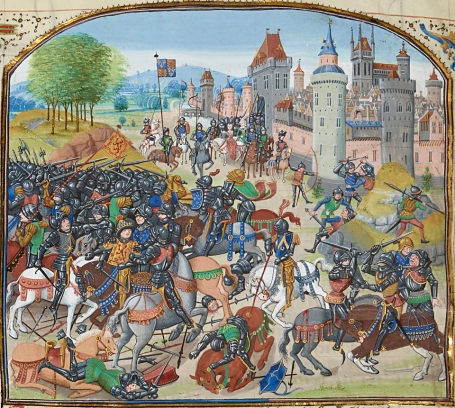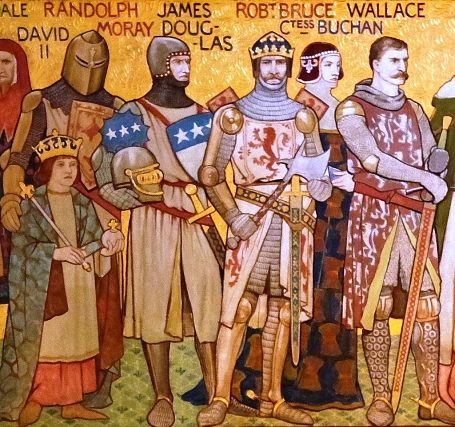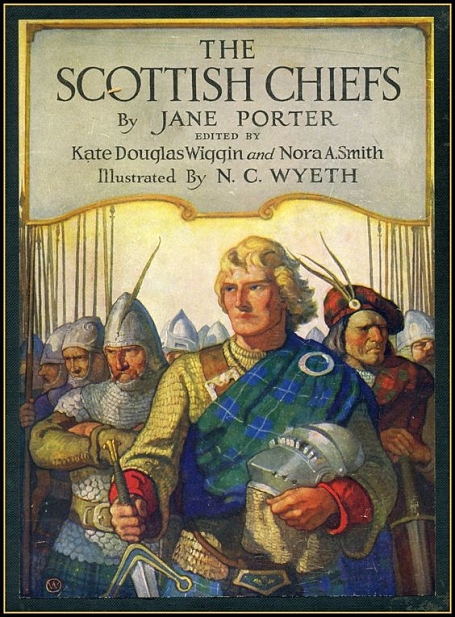The Life and Heroick Actions of the Renoun'd Sir William Wallace,
General and Governour of Scotland
by William Hamilton of Gilbertfield
Book VIII, Chapter III (Continued)
How WALLACE march'd into England, and remained Three Quarters of a Year, and returned without Battle
Good Lundie then, he called to him there,
And Hugh the Hay, of Lochartquart the Heir.
Three Thousand Men, he quickly with him sent
Then quietly out from the Host they went.
The Men he took, that came to him of new,
To be their Guides, for they the Country knew.
Silence profound he order'd there to be,
And then drew up the Host most privately.
Rymount, he with Seven Thousand did advance,
Of English Horse, who there did proudly prance.
The Ambush then, Bambusl'd all their Game,
For with pel-mel the Scots upon them came.
Three thousand whole they quickly brought to Ground,
And with a Vengeance there were all cut down.
Sir Ralph himself, was sticked with a Spear,
Then all the Rest in Hurry fled, with Fear.
To Miltoun, where Wallace pursued fast,
Great Numbers kill'd, and seiz'd the Town at last.
Great store of Riches, he got in the Town,
Wherewith it did so very much abound.
Plenty of Victuals, Ale, and noble Wine
Sent to his Host, a very Sweet Propine.
They ate and drank, truss'd off their whole Desire,
Broke down the Walls, and set the rest on Fire.
Three Days he liv'd, at the Expence and Cost,
Of South'ron, then returned to his Host.
Caus'd cast a Ditch about him speedily
To keep his Camp from sudden Jeopardie.
When English-Men got Notice of this Thing,
They from all Airts, ride straight unto their King,
Who lay at Pumfret, but his Parliament,
Battle to give, would not at all consent.
Which carri'd was, by most of all their Votes,
Unless that Wallace, crown'd were King of Scots.
But if on him, Wallace the Crown would take,
To give him Battle, all would ready make.
This Message quickly they to him dispatch'd,
But in that Snare he was not to be catch'd.
The Messengers he quickly did discharge,
Out of his Presence in a mighty Rage.
His Council call'd, and told them all the Plot,
And treasonable Message he had got.
"It were," said he, "a too presumptous Thing,
Against my Faith, to rob my righteous King.
It's ne'er be said in Country, nor in Town;
I'm such a Rogue, as to usurp the Crown.
But still my King, and Country, I'll defend,
Let GOD above reward me in the End."
Some cry'd to crown him; some said the Consent
Must first be had of a Scots Parliament.
Campbel the Knight, was there among the rest,
Who in his Judgement, thought it truely best;
To crown him King solemnly, for a Day,
And put an End to Edward's long Delay.
Which, when the Earl Malcom he did hear,
Both he and People, all were very clear.
Yet Wallace in his Mind abhor'd the Thing,
Tho' all cry'd out to crown and make him King.
Then in short Terms he said it ne'er should be,
"Rest satisfy'd, you get no more of me.
But if you please to let the Story pass,
That I am crown'd, (tho' still the same I was)
Assuredly we quickly then shall know,
Whither, they do design to fight, or no."
Then to the Messengers the News they bring,
Make them believe Wallace was crowned King.
Who like poor credulous and lying Sots,
Affirm they saw Wallace crown'd King of Scots.
Then said the Lords, "He did so well before,
Now when he's King he'll certainly do more.
If we give Battle he's so Fortunate,
We may repent it, when it is too late."
Then spoke another, "He must Battle have,
Or wast our Land, ther's nothing else can save,
Thro' all his Conquests first since he began,
Nothing but Death ransoms an English-Man.
Woodstock said, "Tho' we Fight and them Defeat,
They've Men enough behind, that will debate;
If Wallace be but safe, they do not care,
Therefore, methinks more safe, and sure it were:
To keep each Strength, Castle and walled Town,
And save our Men; than to expose our Crown."
Then all approv'd what Woodstock he did say,
And cowardly the Battle did delay.
Thus thro' their Falshood, and Subtility,
Thinking that Wallace of Necessity:
Thro' want of Food his Ground could never stand,
But be oblig'd to steal out of the Land:
Advis'd the King, to cry the Mercats down,
From Trent to Tweed, in ev'ry Burgh and Town.
That in the Bounds no Man should Victual lead,
Under the pain of Death without remead.
Wallace lay still, while Fourty Days were gone,
Waiting to fight, but Battle got he none.
The Scottish Banner then he did display,
Trode under Foot the English Seal that Day.
An ignominious, but deserving Thing,
To such a base, and cowardly, false King.
Then rais'd he Fire, burn'd Northallartoun,
March'd thro' York-Shire, boldly up and down.
Destroy'd that Land, as far as they could ride,
Seven Miles about they burn'd on ev'ry Side.
Proud Palaces, and Tow'rs, they did cast down,
Gardens and Orchards there did all confound.
Nothing they spar'd of all came in their Lurch,
But Women, Children, and the Holy Church.
To York they march, and then they very soon,
With all their Force, closely besiege the Town.
A strong Defence, they do prepare within,
And they without, a grand Assault begin.
The ballad, The Life and Heroick Actions of the Renoun'd Sir William Wallace, General and Governour of Scotland, by William Hamilton of Gilbertfield, 1722, is in the public domain.

The Kingdom of England and the Kingdom of Scotland fought dozens of battles with each other. They fought typically over land, particularly Berwick-Upon-Tweed, and the Anglo-Scottish border frequently changed as a result. Read more at Wikipedia.

The First War of Scottish Independence was the initial chapter of engagements in a series of warring periods between English and Scottish forces lasting from the invasion by England in 1296 ... Read more at Wikipedia.

Digitized version of The Scottish Chiefs, by Jane Porter, a novelization published in 1921 by Charles Scribner's Sons, about William Wallace and the First Scottish War of Independence. Read online at archive.org.